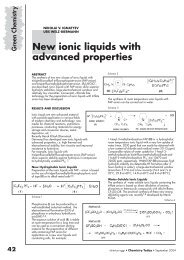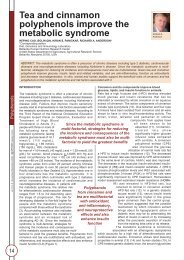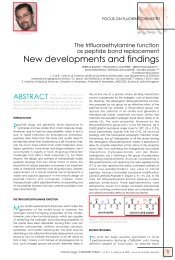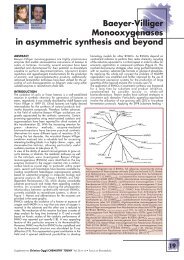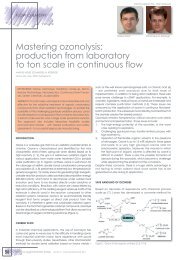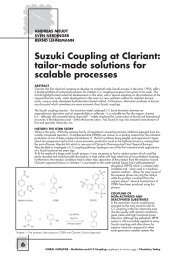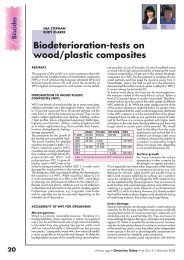Lake Como 2|4 October 2011 - CHIMICA Oggi/Chemistry Today
Lake Como 2|4 October 2011 - CHIMICA Oggi/Chemistry Today
Lake Como 2|4 October 2011 - CHIMICA Oggi/Chemistry Today
You also want an ePaper? Increase the reach of your titles
YUMPU automatically turns print PDFs into web optimized ePapers that Google loves.
SPEAKER SPEAKER SPEAKER SPEAKER SPEAKER SPEAKER SPEAKER SPEAKER SPEAKER SPEAKER SPEAKER SPEAKER SPEAKER SPEAKER SPEAKER SPEAKER SPEAKER SPEAKER SPEAKER SPEAKER SPEAKER SPEAKER SPEAKER SPEAKER SPEAKER SPEAKER SPEAKER SPEAKER SPEAKER SPEAKER SPEAKER SPEAKER SPEAKER SPEAKER SPEAKER SPEAKER SPEAKER SPEAKER SPEAKER SPEAKER SPEAKER SPEAKER SPEAKER SPEAKER SPEAKER SPEAKER SPEAKER SPEAKER SPEAKER SPEAKER SPEAKER SPEAKER SPEAKER SPEAKER<br />
ABSTRACT<br />
BIOGRAPHY<br />
Chemical synthesis and processing using fl ow reactors<br />
Ian Baxendale<br />
University of Cambridge - UK<br />
Ian Baxendale<br />
Ian R. Baxendale conducted his PhD under the supervision of Prof. Pavel Kocovsky at the<br />
University of Leicester investigating new Organometallic catalysts based on group VI transition<br />
metals for stereoselective allylic substitution reactions. He then moved to a postdoctoral<br />
position with Prof. Steven V. Ley at the University of Cambridge initially conducting Natural<br />
Product synthesis prior to entering into the fi eld of Solid Supported Reagents and Scavengers.<br />
In 2005 he co-founded the Innovative Technology Centre (ITC) as a centre of excellence<br />
for the study and development of advanced chemical synthesis tools and methodologies.<br />
To this end the centre specialises in the design and implementation of enabling<br />
technologies such as fl ow chemical synthesis, microwave reactors and<br />
immobilised reagents and scavengers to expedite complex chemical<br />
transformations.<br />
In 2009 Baxendale became a Royal Society University Research Fellow<br />
working in the Department of <strong>Chemistry</strong> at Cambridge.<br />
During the last decade there has been a steady growth in interest within the chemical community for fl ow chemistry<br />
approaches to synthetic targets due to inherent benefi ts such as automated and telescoped reaction sequences, quick<br />
reaction optimisations and in-line work-ups and purifi cations.<br />
Consequently, fl ow chemistry addresses both environmental and economic drivers.<br />
However, conducting fl ow chemistry requires changes in synthesis planning and execution and so we should be careful to<br />
determine the true the benefi ts and assess the worth of altering current working practice.<br />
This talk will focus on some of the benefi ts that can be realised using fl ow chemical processing using examples conducted in<br />
our laboratories.<br />
7<br />
<strong>Lake</strong> <strong>Como</strong><br />
<strong>2|4</strong> <strong>October</strong> <strong>2011</strong>



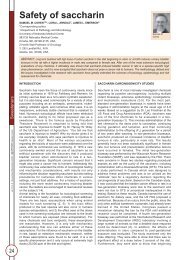
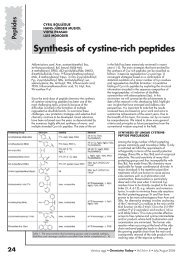
![Pietro Delogu [modalità compatibilità]](https://img.yumpu.com/12255149/1/190x135/pietro-delogu-modalita-compatibilita.jpg?quality=85)
